PAUL T. GOLDMAN Director Jason Woliner Breaks Down the Unconventional Series (So Far)
January 20, 2023 by Marisa Roffman
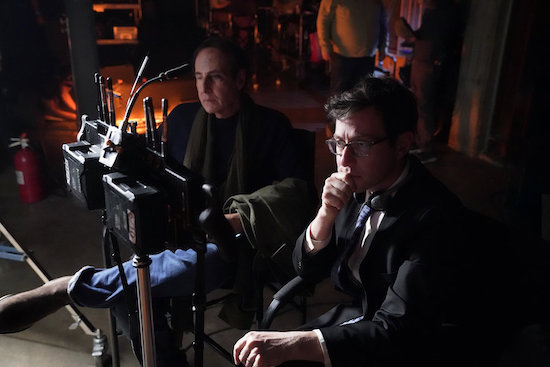
PAUL T. GOLDMAN — “Chapter 5: The Chronicles“ Episode 105 — Pictured: (l-r) Paul T. Goldman as Paul T. Goldman, Jason Woliner as Jason Woliner — (Photo by: Evans Vestal Ward/Peacock)
Peacock’s new series PAUL T. GOLDMAN is, frankly, indescribable.
The official logline says the show “is a mind-bending series from the director of BORAT SUBSEQUENT MOVIEFILM and the producers of THE DISASTER ARTIST. It’s a project that director Jason Woliner has been shooting for over a decade and a story that continues to pile on jaw-dropping new twists. In the style of Woliner’s work on BORAT SUBSEQUENT MOVIEFILM, the series is a groundbreaking project that mixes fact and fiction to tell a bizarre and incredible tale.” But that barely scratches the surface.
At its core, the show is about Paul T. Goldman, a man who becomes convinced his second ex-wife’s secret double-life is actually a cover for sex-trafficking. Naturally, Goldman is determined to expose her—and her cohorts’—wrong-doings. But this isn’t a scripted drama: Goldman is a real man, who used Twitter to connect with Woliner over a decade ago, and has published a number of his own books and videos about his claims.
For Peacock’s series, Woliner didn’t go with a straight-forward documentary. Rather, he used Goldman’s scripts to retell what Goldman claimed happened—with Goldman playing himself—as well as traditional sit-down interviews and behind-the-scenes footage of Goldman’s life, including production on the show itself.
Ahead of the Sunday, January 22 finale, Woliner talks with Give Me My Remote about his decade-long journey to make PAUL T. GOLDMAN—and becoming a character in the story.
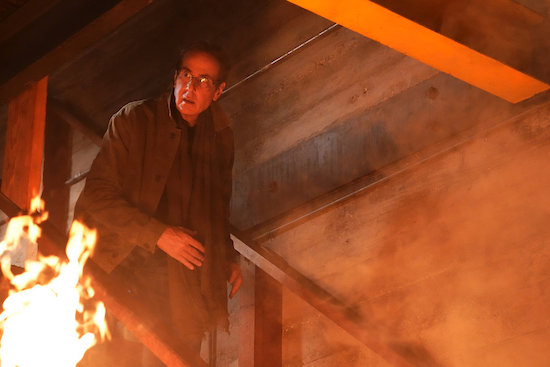
PAUL T. GOLDMAN — “Chapter 5: The Chronicles“ Episode 105 — Pictured: Paul T. Goldman as Paul T. Goldman — (Photo by: Evans Vestal Ward/Peacock)
The series bounces between a number of ways to tell this story. At what point in the ten year process did you land on how to tell the story, and why?
It was really evolving the whole time, the first few years I was working on it. You know, he reached out to me on Twitter, and I became very obsessed with his book. As soon as I met him, I felt like he, himself, was the story as much as the story he was telling. He was the most interesting, fascinating part of it.
And so it became about trying to figure out how to capture that, and how to convey that. Growing up, I loved a lot of documentary projects, like AMERICAN MOVIE or GRIZZLY MAN or Errol Morris’ stuff, TABLOID or MR. DEATH…these portraits of very unique individuals. And I was like, “Yep, Paul feels like in that zone.” Someone you could really examine all sides of him and his story and spend hours with. How do you do that?
He had written this book, and he had written this screenplay. And to me, what was so interesting about all this stuff was the scenes he wrote and the subtext and what he was saying with them. And what I saw in them that maybe wasn’t exactly what he was saying with them, and the difference between what he was saying and what I thought the scenes said through subtext. So I just thought the most interesting way to do it would be to have him starring in it and then document that process, and really just kind of crack open his brain and try to look around.
But, at the same time, I really did want him to steer and lead as much as possible. So I didn’t suggest that for a few years, until he kind of came to it on his own. And we did some tests, auditions, and he got to thinking, “Wouldn’t it be interesting if I starred in it?” He was talking to the camera in the middle of scenes and he just would break the fourth wall. And these are all things I was hoping he would land on his own.
And then eventually he’s like, “Why don’t you interview the real people?” The scene in the second episode, with Lena, his first wife, [she] just wound up being at the auditions; he invited her and their son John. And that happened the way you see it in the show—it was all on camera. He was like, “Why don’t you do it?” [and they acted out a scene together where they split].
It just became this thing that kind of kept evolving and just kind of revealing and telling me what it was along the way. We got a pilot in 2017, and that’s the first episode. And I had my friend, a documentarian named Jason Tippet, running a third camera to get these behind the scenes moments. And in the editing of that, I started to realize how important those were to telling the full story. And so when we did the whole show—we did the rest of the show this year—I knew going in that these behind the scenes elements would be a very important part of it.
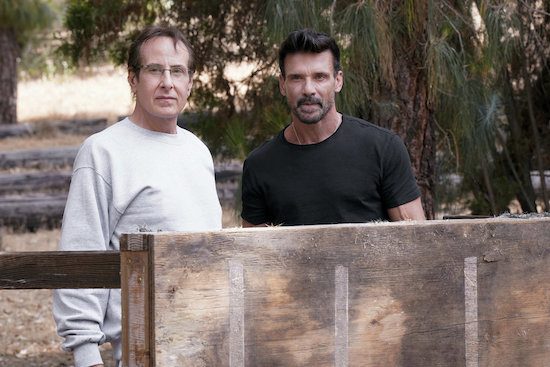
PAUL T. GOLDMAN — “Chapter 5: The Chronicles“ Episode 105 — Pictured: (l-r) Paul T. Goldman as Paul T. Goldman, Frank Grillo as Dan Hardwick — (Photo by: Evans Vestal Ward/Peacock)
Looking at your casting process for a moment, what was the key to getting actors who would work well with Paul both on-screen for the scripted elements, but also off-screen for those between takes moments…especially given the stories we saw him tell them?
I’ve never seen anything like this in terms of taking someone who had never been on-camera before, putting them with really talented actors. I Zoomed with every actor, every guest star, before they would come in. The ones who I reached out to for what they call offer-only were [when it was], “Oh, I would love Frank Grillo to play this guy in episode 5.” And so I sent him a letter and a few scenes that we had shot in 2017 to give him a sense of what the show would be. And then I Zoomed with him.
It was nothing secretive or nothing that Paul couldn’t have been on…[but] I also wanted to get all that on camera for the show. But it wasn’t like, “Hey, we’re pulling one over on this guy.” [The meetings were] very upfront in…”This is a real person. He’s rough around the edges in terms of acting, in terms of writing. He’s not a professional writer. But I think these scenes are very interesting and I think if we commit to them, and try to shoot them and make them look nice, and you act and you don’t try to make it funny, just try to perform it like you would a dramatic thing, I think something interesting might emerge.”
Actors are very cool. It’s so rare that somebody comes to you and there’s an experimental element to it. Or you’re going in to try to discover something. Usually, there’s a fixed idea of something and directors are giving them line readings or whatever. This was kind of the opposite of that. This was, “We have this material. We have Paul. We have a crew. Let’s see what happens.” The actors I went out to, it was all on instinct on who I thought would be great. And I just got very, very lucky that everyone was so cool and game and the right tone. Patient and approach that [off-screen element] with curiosity and not playing it like it’s a joke or a prank or anything.
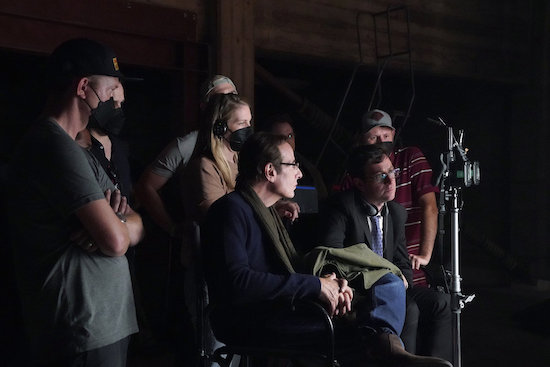
PAUL T. GOLDMAN — “Chapter 5: The Chronicles“ Episode 105 — Pictured: (l-r) Paul T. Goldman as Paul T. Goldman, Jason Woliner as Jason Woliner — (Photo by: Evans Vestal Ward/Peacock)
As the story evolved, you became an on-screen character in Paul’s scripted story. What was the process like coming to terms with that—and then having to keep yourself in there in the final edit?
I was not only reluctant, I was adamant I wouldn’t be in it for years. Earlier on, I was like, “I’ll be a voice; you can hear me ask a question. But I really don’t like being on camera.” I was an actor when I was a kid; I think I had my fill of being on camera by the time I was 12. And so everything I’ve been in…I really avoided putting myself front and center. And these kinds of documentary projects, I don’t mind when a filmmaker, you hear them every once in a while ask a question or there’s just kind of intentional moments where they make themselves known and remind you there’s a person behind this, shaping what you’re seeing. I didn’t want this to be Morgan Spurlock or like THE JINX’s Andrew Jarecki, where it’s really as much about the filmmaker as it is about Paul.
But that said, years and years go by as we’re trying to make this, we’re shooting off and on. And one day he just handed me some pages that are in episode 5, where he wrote a monologue for me. And it’s like, “Jason says, ‘When I met Paul…’” And I was like, “Oh, Paul. I’m not going to be in this.” And he kept pushing.
At a certain point, I had to admit that when the show kind of folds in on itself and becomes about the making of itself, I had to come to terms with being part of it. But that struggle is real. We wound up getting an actor to play me. Paul kept firing him. It was all real. Luckily, it was Jake Regal…he’s so talented, and was such a good sport about it. You can see in the show, he’s very likable.
I wasn’t around for a lot of the actors when they got interviewed between takes, I was on set lighting and figuring it out. And Jason Tippet, the documentary filmmaker, would just grab an actor and talk to them. So when you have Jake Regal in episode 5 talking about how people aren’t going to be sure what they think of me, it’s not, like, me off camera telling him to say that; I wasn’t even there for that.
And then the editor put that in a cut and I was like, “Oh, we can’t put that in. That’s too weird and confusing, because people watching it know I edited this. So it [looks like] I chose to put in a guy’s [testimonial] that you shouldn’t be sure what to think about me.” And then they convinced me: “No, no, that’s a good moment. That’s good to remind people that your role in this is something to consider, and the power dynamic and all that stuff.” Eventually, I was convinced that it wouldn’t be too weird.
But, yeah, it has definitely been a process of coming to terms with the fact that I would be part of it, on-camera.
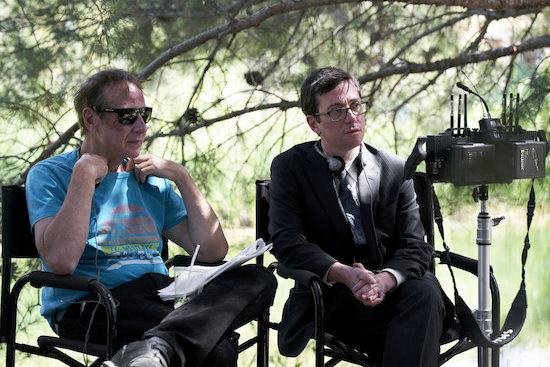
PAUL T. GOLDMAN — “TBD” Episode 104 — Pictured: (l-r) — (Photo by: Tyler Golden/Peacock)
As you’ve noted, you spent a decade working on this. While you were clearly busy with other projects as well—including directing BORAT SUBSEQUENT MOVIEFILM and episodes of NATHAN FOR YOU, THE LAST MAN ON EARTH, and WHAT WE DO IN THE SHADOWS—what was the most complicated part of getting this actually together? And was there any point where you considered giving it up?
So, it’s a good question—I’m very stubborn. And, I guess, similar to Paul, have this kind of delusional tenacity, some might say. I don’t think Paul is…I don’t think he’s crazy. I think he’s extremely focused, and he locks on to something. Maybe that’s something I related to, because this was a thing that I decided I wanted to do and I never let go.
Definitely there were moments along the way of, “What am I doing?” The hardest thing was really just getting it made. And it all happened in steps. It was trying to make it as a feature, and realizing, oh, it might be easier to get someone to pay for this if we did it on streaming; there’s more money there than in the independent documentary world. And then selling a pilot to Hulu…and then that didn’t work. But then I had the scenes that we shot for Hulu, so it was much easier.
You know, this is a very hard show to describe. I wish there was an easy one sentence way to kind of give a synopsis. It is pretty difficult. [Laughs.] So just sitting in meetings, year upon year, trying to describe what it’ll be…it was just very hard to get it to the point where we actually got a green light and knew we were making it and got some money to do it right. That was the hardest thing I think. And everything else. [Laughs.]
It’s been hanging over my head. I mean, we only finished that finale, we delivered it [in early January] to Peacock…up until last week, it’s been a kind of question mark hanging over my head, for the last decade, of what is it finally going to be? So I think just that ambient stress and processing of, “Is this going to work and is this going to make any sense and are people going to like it, are people going to hate me?”—all that stuff has just kind of been hanging out for a while.
PAUL T. GOLDMAN, Peacock
Follow @GiveMeMyRemote and @marisaroffman on Twitter for the latest TV news. Connect with other TV fans on GIVE ME MY REMOTE’s official Facebook page.
And be the first to see our exclusive videos by subscribing to our YouTube channel.
As an Amazon Associate we earn from qualifying purchases made through links/ads placed on the site.
Related Posts
Filed under Paul T. Goldman
Comments Off on PAUL T. GOLDMAN Director Jason Woliner Breaks Down the Unconventional Series (So Far)



Comments